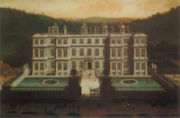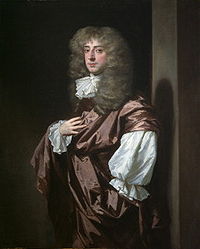
Henry Thynne (1675–1708)
Encyclopedia


Kingdom of England
The Kingdom of England was, from 927 to 1707, a sovereign state to the northwest of continental Europe. At its height, the Kingdom of England spanned the southern two-thirds of the island of Great Britain and several smaller outlying islands; what today comprises the legal jurisdiction of England...
gentleman
Gentleman
The term gentleman , in its original and strict signification, denoted a well-educated man of good family and distinction, analogous to the Latin generosus...
and Tory
Tory
Toryism is a traditionalist and conservative political philosophy which grew out of the Cavalier faction in the Wars of the Three Kingdoms. It is a prominent ideology in the politics of the United Kingdom, but also features in parts of The Commonwealth, particularly in Canada...
Member of Parliament
Member of Parliament
A Member of Parliament is a representative of the voters to a :parliament. In many countries with bicameral parliaments, the term applies specifically to members of the lower house, as upper houses often have a different title, such as senate, and thus also have different titles for its members,...
.
Thynne was the eldest of the three sons of Thomas Thynne, 1st Viscount Weymouth (1640–1714), of Longleat
Longleat
Longleat is an English stately home, currently the seat of the Marquesses of Bath, adjacent to the village of Horningsham and near the towns of Warminster in Wiltshire and Frome in Somerset. It is noted for its Elizabethan country house, maze, landscaped parkland and safari park. The house is set...
, a substantial landowner in Wiltshire
Wiltshire
Wiltshire is a ceremonial county in South West England. It is landlocked and borders the counties of Dorset, Somerset, Hampshire, Gloucestershire, Oxfordshire and Berkshire. It contains the unitary authority of Swindon and covers...
and Gloucestershire
Gloucestershire
Gloucestershire is a county in South West England. The county comprises part of the Cotswold Hills, part of the flat fertile valley of the River Severn, and the entire Forest of Dean....
, by his marriage to Lady Frances Finch, a daughter of Heneage Finch, 3rd Earl of Winchilsea
Heneage Finch, 3rd Earl of Winchilsea
Sir Heneage Finch, 3rd Earl of Winchilsea of Eastwell, Kent, was the 3rd Earl of Winchilsea.Finch was the son of Thomas Finch, 2nd Earl of Winchilsea, and the grandson of Elizabeth Finch, 1st Countess of Winchilsea. His first cousin was Heneage Finch, 1st Earl of Nottingham. He married four...
. He was christened
Infant baptism
Infant baptism is the practice of baptising infants or young children. In theological discussions, the practice is sometimes referred to as paedobaptism or pedobaptism from the Greek pais meaning "child." The practice is sometimes contrasted with what is called "believer's baptism", or...
on 16 February 1674/75 at Drayton Bassett
Drayton Bassett
Drayton Bassett is a village and civil parish in the District of Lichfield, Staffordshire, England. Nearby are the town of Tamworth and Middleton Lakes RSPB reserve, formerly a gravel quarry known in part as Drayton Bassett Pits.It formerly had a manor....
.
Thynne was educated at home and was very interested in literature. In 1692 he visited the Netherlands
Netherlands
The Netherlands is a constituent country of the Kingdom of the Netherlands, located mainly in North-West Europe and with several islands in the Caribbean. Mainland Netherlands borders the North Sea to the north and west, Belgium to the south, and Germany to the east, and shares maritime borders...
, Germany
Germany
Germany , officially the Federal Republic of Germany , is a federal parliamentary republic in Europe. The country consists of 16 states while the capital and largest city is Berlin. Germany covers an area of 357,021 km2 and has a largely temperate seasonal climate...
, and Italy
Italy
Italy , officially the Italian Republic languages]] under the European Charter for Regional or Minority Languages. In each of these, Italy's official name is as follows:;;;;;;;;), is a unitary parliamentary republic in South-Central Europe. To the north it borders France, Switzerland, Austria and...
. As a young man, he taught French
French language
French is a Romance language spoken as a first language in France, the Romandy region in Switzerland, Wallonia and Brussels in Belgium, Monaco, the regions of Quebec and Acadia in Canada, and by various communities elsewhere. Second-language speakers of French are distributed throughout many parts...
and Italian
Italian language
Italian is a Romance language spoken mainly in Europe: Italy, Switzerland, San Marino, Vatican City, by minorities in Malta, Monaco, Croatia, Slovenia, France, Libya, Eritrea, and Somalia, and by immigrant communities in the Americas and Australia...
to his contemporary Elizabeth Singer
Elizabeth Rowe
-Life:She was the eldest daughter of Elizabeth Portnell and Walter Singer, a dissenting minister. Born in Ilchester, Somerset, England, she began writing at the age of twelve and when she was nineteen, began a correspondence with John Dunton, bookseller and founder of the Athenian Society.Between...
(1674–1737), in whom Bishop Thomas Ken
Thomas Ken
Thomas Ken was an English cleric who was considered the most eminent of the English non-juring bishops, and one of the fathers of modern English hymnology.-Early life:...
, then living at Longleat, had taken an interest when she was twelve. In To the Painter of an Ill-Drawn Picture of Cleone, the Honorable Mrs Thynne, a poem by Anne Finch, Countess of Winchilsea, Thynne appears under the name of "Theanor", while "Cleone" was his wife Grace, to whom Lady Winchilsea addressed several of her poems.
At the election of 1695 Thynne stood unsuccessfully for parliament
Parliament of England
The Parliament of England was the legislature of the Kingdom of England. In 1066, William of Normandy introduced a feudal system, by which he sought the advice of a council of tenants-in-chief and ecclesiastics before making laws...
at Weobley
Weobley (UK Parliament constituency)
Weobley was a parliamentary borough in Herefordshire, which elected two Members of Parliament to the House of Commons in 1295 and from 1628 until 1832, when the borough was abolished by the Great Reform Act.- MPs 1628–1660 :...
. He later sat as a Member of Parliament for Weymouth and Melcombe Regis
Weymouth and Melcombe Regis (UK Parliament constituency)
Weymouth and Melcombe Regis was a parliamentary borough in Dorset represented in the English House of Commons, later in that of Great Britain, and finally in the Parliament of the United Kingdom. It was formed by an Act of Parliament of 1570 which amalgamated the existing boroughs of Weymouth and...
in 1701, then briefly for Tamworth
Tamworth (UK Parliament constituency)
Tamworth is a parliamentary constituency represented in the House of Commons of the Parliament of the United Kingdom. It elects one Member of Parliament by the first past the post system of election.- History :...
before representing Weymouth and Melcombe Regis again until his death in 1708. At Tamworth, he was returned unopposed with Thomas Guy
Thomas Guy
Thomas Guy was a British bookseller, speculator and de facto founder of Guy's Hospital, London-Early life:Thomas Guy was born a son of a lighterman, wharf owner and coal-dealer at Southwark. In 1668, after eight years as an apprentice of a bookseller, he began his own bookstore in Lombard Street...
(1644–1724), the speculator and founder of Guy's Hospital
Guy's Hospital
Guy's Hospital is a large NHS hospital in the borough of Southwark in south east London, England. It is administratively a part of Guy's and St Thomas' NHS Foundation Trust. It is a large teaching hospital and is home to the King's College London School of Medicine...
. Guy was a Whig
Whiggism
Whiggism, sometimes spelled Whigism, is a historical political philosophy that grew out of the Parliamentarian faction in the Wars of the Three Kingdoms. The whigs' key policy positions were the supremacy of Parliament , toleration for Protestant dissenters, and opposition to a Catholic on the...
, while Thynne was a Tory
Tory
Toryism is a traditionalist and conservative political philosophy which grew out of the Cavalier faction in the Wars of the Three Kingdoms. It is a prominent ideology in the politics of the United Kingdom, but also features in parts of The Commonwealth, particularly in Canada...
.
On 29 April 1695, Thynne married Grace Strode, the daughter and heiress of Sir George Strode and Grace FitzJames, who brought him a fortune of £
Pound sterling
The pound sterling , commonly called the pound, is the official currency of the United Kingdom, its Crown Dependencies and the British Overseas Territories of South Georgia and the South Sandwich Islands, British Antarctic Territory and Tristan da Cunha. It is subdivided into 100 pence...
20,000. They had two daughters, Frances Thynne, who married Algernon Seymour, 7th Duke of Somerset
Algernon Seymour, 7th Duke of Somerset
General Algernon Seymour, 7th Duke of Somerset was the son of Charles Seymour, 6th Duke of Somerset and his wife, Elizabeth...
, and Mary Thynne (ca. 1702–1720), who married William Greville, 7th Baron Brooke (1695–1727). His grand-children included Elizabeth Percy, Duchess of Northumberland
Elizabeth Percy, Duchess of Northumberland
Elizabeth Percy, née Seymour, Duchess of Northumberland, heiress to the earldom of Northumberland and 2nd Baroness Percy was a British peeress....
.
Thynne became extremely fat. After he had died suddenly on 20 December 1708, the findings of a post mortem were reported in a letter to Edward Harley
Edward Harley, 2nd Earl of Oxford and Earl Mortimer
Edward Harley, 2nd Earl of Oxford and Earl Mortimer , styled Lord Harley between 1711 and 1724, was a British politician, bibliophile, collector and patron of the arts.-Background:...
from his sister:
On 3 January 1708/9 he was buried at Longbridge Deverill
Longbridge Deverill
Longbridge Deverill is a village and civil parish about south of Warminster in Wiltshire, England. The village is one of the Lower Deverills....
.

